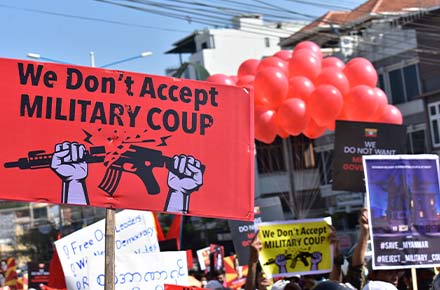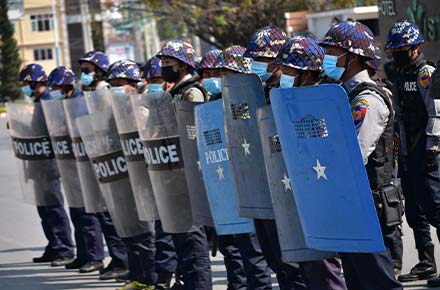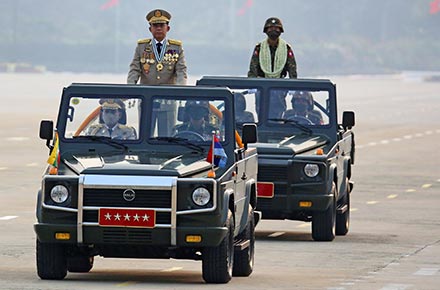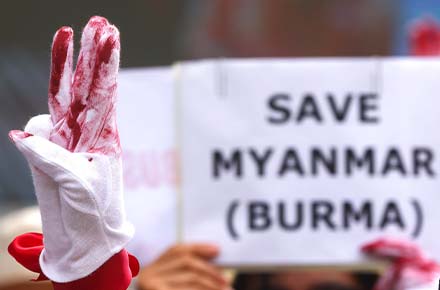Myanmar: on the brink of collapse
Yola VerbruggenThursday 10 June 2021

Following widespread abuses, demonstrators are determined to get rid of the military and protests are paralysing Myanmar. Global Insight assesses the toll on the country and the need for a swift international response.
Header pic: Refugees stage a protest against China’s support of a new military rule in Myanmar, Delhi, india, 3 March 2021. Shutterstock.com / Ayush Chopra Delhi
Months after the power grab by Myanmar’s generals in February, the coup is by no means a fait accompli. Despite the wanton killings, arbitrary arrests and reports of torture, protestors continue to defy their would-be rulers who so brutally abandoned the country’s path to democracy.
The rule of law is now merely a smokescreen to justify the military’s actions and, as a result of sustained strikes, the economy has come to a standstill. With doctors also refusing to work, Covid-19 testing and vaccination has stopped and other health services are largely unavailable. Persecuted protestors are fleeing to the border areas where they receive protection from the country’s ethnic armed groups, which have for decades been embroiled in a civil war with the military. Armed conflict in these areas has intensified since the coup and Myanmar’s National Unity Government, set up by the opposition, has announced the formation of a ‘people’s defence force’ to protect protestors from the military.
Hundreds of civilians have been killed since the coup, some at point-blank range, and thousands are in prison. Many others are in hiding, spending each sleepless night in another house as soldiers conduct midnight raids, while many of those caught are forcibly disappeared. These undeclared overnight stays have been made illegal with the reintroduction of the household registration system, adding to the climate of fear that once again is taking hold.
‘The way you measure a society is by the strength of its institutions, which have been completely corrupted since the coup’, says Baroness Helena Kennedy, Director of the International Bar Association’s Human Rights Institute. ‘The generals’ phoney move toward democracy has ended.’
The international response
On the global stage, the military struggles to gain legitimacy, due predominantly to the sustained protests challenging the coup domestically, says Chris Sidoti, a member of the Special Advisory Council on Myanmar, an independent group of international experts that encourages international support to the democratic opposition.
‘There is a window, and the amazing thing is the window is still open. That’s because the protest actions have continued now for three months, without let-up. We have an added opportunity to respond’, Sidoti tells Global Insight. ‘The window opening has been extended, but it is time-limited. If the military consolidates its power, it will be much harder and it will take a much longer period of time to dislodge it.’
The Special Advisory Council has called for a ‘three-cuts’ strategy against the Tatmadaw (Myanmar’s armed forces), involving targeted sanctions against senior military officials and military-owned companies, an arms embargo and a referral to the International Criminal Court.
Sidoti was part of the UN Fact-Finding Mission on Myanmar that investigated the army’s abuses in the country’s Kachin, Rakhine and Shan states, which included violence perpetrated against the Rohingya. The body called for the investigation and persecution of Myanmar’s Commander-in-Chief, Senior General Min Aung Hlaing, and other top generals for genocide, crimes against humanity and war crimes.

Protest against the military coup, Taunggyi, Myanmar, 20 February 2021. Shutterstock.com / Robert Bociaga
It’s up to the international community to put as much pressure on the military as possible, there is no doubt about that
Chris Sidoti
Member of the Special Advisory Council on Myanmar
‘We said very unequivocally in 2018 that Myanmar was destined to repeat its very tragic history until, and unless, the military was held to account for its actions. Regrettably, we see our assessment being vindicated’, Sidoti says. ‘It’s up to the international community to put as much pressure on the military as possible, there is no doubt about that. [In 2018] the UN Fact-Finding Mission recommended economic disengagement from the military as a means of bringing it under proper democratic civilian control. The good thing is that over the last three months, since the coup, we have finally seen both countries and companies adopting these recommendations.’
Collective international action by the UN Security Council is unlikely because of the veto power of permanent members China and Russia, which both sent representatives to Myanmar’s Armed Forces Day Parade on 27 March 2021, when the military killed more people than on any other day since the coup. Neighbouring countries Bangladesh, India, Laos and Pakistan also sent officials, as did Thailand and Vietnam.
Amid concerns over extending legitimacy to the junta, the Association of Southeast Asian Nations invited General Min Aung Hlaing to its summit in Indonesia in April this year, where they urged him to end the violence against peaceful protestors and to start a dialogue with the country’s elected leaders. The violence continued.
Calls are now mounting on the UN Security Council to adopt an arms embargo. ‘Imposing a global arms embargo on Myanmar is the minimum necessary step the Security Council should take in response to the military’s escalating violence. Arms and materiel provided to Myanmar’s security forces are likely to be used by the security forces to commit abuses in violation of international human rights and humanitarian law’, over 200 organisations said in a statement to the Council in May.
In March, Russia announced its wish to strengthen military ties with Myanmar. China, India, Israel, Russia and Ukraine are the country’s main arms suppliers, according to the Stockholm International Peace Research Institute.
‘It's devastating to witness the current human rights crisis in Myanmar and lack of a coordinated international response to the military's actions, especially in light of the relatively high numbers of civilians who have allegedly been killed or detained. Both lives and the future of democracy in the region are at stake’, says Alexa Koenig, Co-Chair of the IBA Human Rights Law Committee and Executive Director of the Human Rights Center at the University of California, Berkeley.
The threat of state collapse
The military has said that the landslide victory of Aung San Suu Kyi’s National League for Democracy party in November 2020 was fraudulent and forced the generals to take control. An estimated five million young people were eligible to vote for the first time in that election, according to the International Foundation for Electoral Systems. These young voters feel robbed of their vote and are unwilling to let go of the freedoms they experienced under the quasi-civilian government since 2015. It is this tech-savvy ‘Generation Z’ that drives the civil disobedience movement that the Tatmadaw has been unable to quell.
It's devastating to witness the current human rights crisis in Myanmar and lack of a coordinated international response to the military's actions
Alexa Koenig
Co-Chair, IBA Human Rights Law Committee
Strikes have crippled the economy, upended the public health system and brought transportation of people and goods to a standstill. Education staff have taken part in the strike already and students, their parents and teachers are calling for further strikes in June, when schools and universities are set to reopen after nearly a year’s closure during the pandemic.
The International Crisis Group, a think tank headquartered in Belgium, warns that the ‘mass protests, public- and private-sector worker strikes, and the security forces’ brutal violence against the population […] are pushing the country toward collapse’.
‘Deep economic crisis, food market dysfunction, rising poverty, a public health emergency and even hunger all now seem inevitable. Risks are growing of an escalation in armed conflict and a large exodus of people from the country’, the organisation states in a recent report.

Police officers form a barricade at a peaceful protest, Taunggyi, Myanmar, 28 February 2021. Shutterstock.com / Robert Bociaga
Neither side is likely to give in to avoid such a scenario. The protestors are emboldened by the widespread support they enjoy among the population and hardened in their resolve to oust the military once and for all following months of indiscriminate violence. They are no longer calling for a return to their elected leaders, but for the Constitution to be abolished, the military to return to their barracks and the instalment of a genuine federal democracy.
The National Unity Government of Myanmar, formed by groups opposing the coup that includes ousted members of parliament and ethnic leaders, is vying with the military for recognition as the country’s legitimate government. Its recently formed ‘people’s defence force’ aims to protect protestors and precedes the creation of a federal army. In the country’s northern Sagaing Region, residents are using homemade firearms and slingshots to defend themselves against the military, according to local media.
The military sees itself as the only rightful guardian of the union and is used to weathering international criticism, as it did following its violent expulsion of the Rohingya. The generals blame the violence in cities and towns around the country on ‘rioters’, as they refer to protestors. Every day, the state mouthpiece announces new arrest warrants and shows photos of young people with bruised faces, likely to be the result of interrogations and meant to intimidate the public.
‘Failed states are often marked by a heightened degree of violence and lawlessness, given that due process safeguards may cease to function and various factions within a state may vie for political and operational control’, says Koenig. ‘If Myanmar were to become a failed state, the physical, financial and emotional suffering of people within Myanmar's borders will likely be compounded. Already exacerbated migration from the country would likely increase even further, putting additional pressure on neighbouring states to meet refugees' basic needs.’
Vying for recognition
The country’s ousted leaders, State Counsellor Aung San Suu Kyi and President Win Myint, remain under house arrest. They face trumped-up charges and are being prosecuted under the country’s repressive penal code, while access to their legal teams has been very limited.
Since their arbitrary internment and the dismissal of elected members of parliament, the generals have tried to convince the population, as well as the international community, of the rightfulness of their actions as protectors of Myanmar’s democracy. But defections by some of its overseas ambassadors, most notably at the United Nations, show that the military is far from gaining the legitimacy it seeks.
‘At this stage, the military is not entitled to international recognition, even as a de facto government, simply because it does not control the territory, it doesn’t even control the cities. Other states and international organisations have to refrain from extending any kind of recognition to the military junta’, says Sidoti.
He adds that the National Unity Government has the best claim for legal recognition because of the representation of various ethnic groups in the body, but that it is yet to establish exactly what level of control it has over the territory. ‘I can understand that governments are holding back from providing recognition to either side, but I can’t understand governments holding back from providing support and encouragement to the National Unity Government’, he adds.
Without a legitimate government, representation in international institutions and the provision of humanitarian aid, usually subject to approval by the authorities, will be complicated, says Koenig. ‘Which entity is ultimately recognised by a majority of nations is likely to have significant mid- and long-term consequences for the human rights of people within Myanmar's borders, including recognition of the citizenship of people who belong to various religious and ethnic communities, and their ability to participate fully in civic life.’

Myanmar’s junta chief Senior General Min Aung Hlaing, who ousted the elected government in a coup on 1 February 2021, presides over an army parade on Armed Forces Day in Naypyitaw, Myanmar, 27 March 2021. REUTERS/Stringer
The strangling of the press
One of the big changes after the military embarked on its road to a ‘disciplined democracy’ in 2010, was the re-emergence of the free press after decades of military propaganda and censorship. Since its independence from the United Kingdom, Myanmar had experienced a burgeoning media landscape. This all changed after the military staged a coup in 1962. But as the county opened up nearly a decade ago, the printing press flourished once again. Also exile media, established in third countries following the uprising of 1988, was allowed to set up in Myanmar.
Only army TV and the army newspaper are left and through it they are telling lies to justify their brutal actions. They lie bluntly to their army and police
Toe Zaw Latt
Operations Director, Democratic Voice of Burma
‘We prefer to report from on the ground and that is why we went back as soon as we were allowed nine years ago’, Toe Zaw Latt, Operations Director of the Democratic Voice of Burma (DvB), tells Global Insight.
Established in 1992 in Olso, Norway, and later operating out of Chiang Mai, Thailand, the DvB provides uncensored news about Myanmar and continues to do so after its entry into the country. In 2018, it was one of five media outlets to receive a broadcasting license. But at 0900 on the morning of the coup, their signal froze. In the weeks that followed, reporters around the country would be arrested, flee across the border or go into hiding.
‘We have always said “one foot in, one foot out”, but we didn’t expect things would be this bad’, Zaw Latt, who spent the first 80 days of the coup inside the country, says.
In March, the last independent newspaper stopped publishing. Only the state mouthpiece is still circulated daily and only military propaganda is shown on television. Initially, independent local media continued broadcasting via satellite, but, in early May, the army banned satellite TV early, citing national security concerns.
For Zaw Latt, this might mean a return to how the news outlet first started: as a shortwave radio station that filled an information vacuum during a media blackout.
The military aims to intimidate and control the population by imposing tough restrictions on the spread of information, but they also use it to shield their own forces from the truth, explains Zaw Latt. Soldiers live in their own compounds, in which they lead separate lives from the rest of the population and where they have their own schools and hospitals. Their exposure to anything other than military propaganda is very limited and is regarded as important to avoid defection.
‘Only army TV and the army newspaper are left and through it they are telling lies to justify their brutal actions. They lie bluntly to their army and police’, Zaw Latt says.
Due to the military’s inability to fully control the spread of information, some military and police officers have broken rank but large-scale defections have not yet been reported.

A protester gives a three-finger salute during a march to protest against the Myanmar military coup, Taipei, Taiwan, 2 May 2021. REUTERS/Ann Wang
On World Press Freedom Day, on 3 May, 50 journalists were detained in Myanmar while dozens more journalists were evading arrest warrants, according to the non-profit organisation Assistance Association for Political Prisoners. Journalists are predominantly charged under section 505(a) of the penal code, which criminalises the spread of information that could cause disobedience within the police or armed forces and is punishable by up to three years in prison.
Internet access
Unlike the uprisings of 1988 and 2007, when any recorded material had to be physically smuggled out of the country, the emergence of the internet means it is now harder for the military to cut off people’s access to information completely. Mobile internet has been inaccessible since mid-March and, at night, full internet shutdowns have occurred for weeks. Still, that has not stopped the flow of footage coming out of Myanmar. Through virtual private networks, foreign SIM cards and offline apps, people continue to show the world what is happening.
‘Not only established journalists, but also citizen journalists want to inform people about what is going on’, explains Zaw Latt.
That is not without risk, however. A lack of internet access in some areas is making it harder to share recorded footage and phones are checked for anything linked to the democratic opposition at army checkpoints.
The internet shutdown has hurt the economy, as the country’s banking and money transfer systems depend on it. Digital rights watchdog Access Now reports that, in an attempt to address this, fixed-line connectivity might now be re-emerging together with a plan to ‘whitelist’ those who the military grants uninterrupted access to. Banking and payment applications are likely to be included.
‘White-listing services does not reflect respect for international human rights law; it in fact flips it on its head, by making complete blocking of the internet the norm and access to web services the exception’, says Access Now.
Before the coup, over half of Myanmar’s population of 54 million were Facebook users. For many, it was their main way of consuming information. As the military’s grip on the country’s information flow tightens, protestors are returning to more traditional methods to keep the population informed, so that they do not fall victim to army propaganda that could undermine the democracy movement.
Analogue solutions are gaining ground, with several printed newsletters being secretly passed from hand to hand in cities as well as rural areas, compiled by those with access to information for those who do not. Several new radio stations have been established, including by the National Unity Government.
Deep economic crisis, food market dysfunction, rising poverty, a public health emergency and even hunger all now seem inevitable
The International Crisis Group
A long quest for justice
Information shared by people inside the country is important for building political will within the international community to take action and to provide information to human rights investigators unable to enter the country, says Wendy Betts, Director of eyeWitness to Atrocities, an IBA initiative focussed on the collection of verifiable video footage of human rights violations for use in investigations and trials.
‘Where access to events on the ground is blocked is where citizen journalists play such a key role. The sheer number of people collecting information, especially in various parts of the country, can show how widespread something is, and the conduct that is portrayed can show which types of violations are occurring’, says Betts.
Both the UN Special Rapporteur on the situation of human rights in Myanmar, Tom Andrews, and the UN Special Envoy on Myanmar, Christine Schraner Burgener, have been denied access to the country.
But after the flood of footage that was posted online during the beginning of the coup failed to produce a significant international response, people have become disillusioned. Betts knows this through her work in Myanmar: ‘There is a lot of frustration and a bit of a feeling of futility, especially after the initial urgency of the footage that was up and what the response to that was, or rather, the lack of response.’
The Independent Investigative Mechanism for Myanmar continues to gather information on any international crimes that are committed in the country. Investigations have also begun for a case before the International Criminal Court. On-the-ground footage can play an important role in these efforts, says Betts. ‘Information now is necessary but [is] not a sufficient condition for justice now. But if you don’t collect it, you can’t get justice in the future’, she says.
Yola Verbruggen is a freelance journalist and can be contacted at yolav@protomail.com




